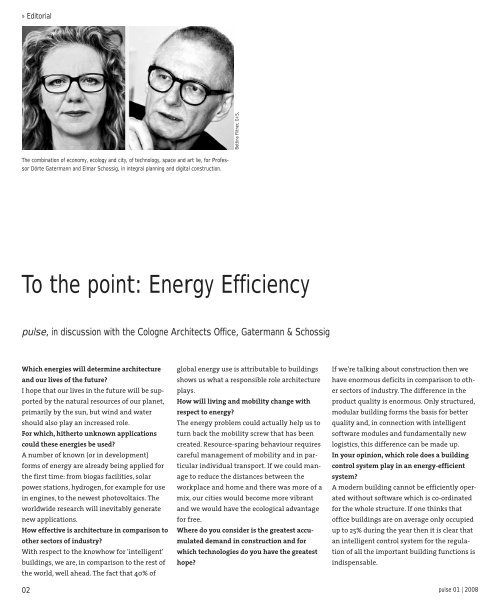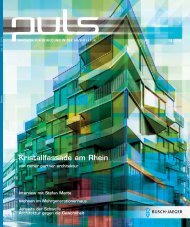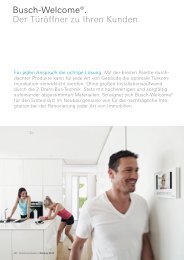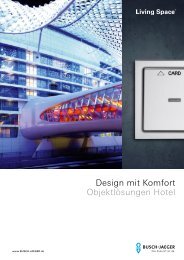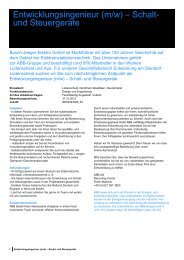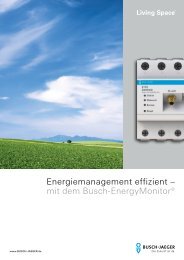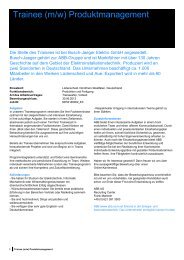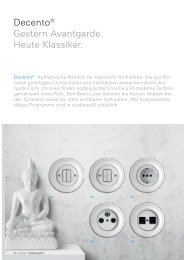The Ultimate Tower – Burj Dubai - Busch-Jaeger Elektro GmbH
The Ultimate Tower – Burj Dubai - Busch-Jaeger Elektro GmbH
The Ultimate Tower – Burj Dubai - Busch-Jaeger Elektro GmbH
Create successful ePaper yourself
Turn your PDF publications into a flip-book with our unique Google optimized e-Paper software.
» Editorial<br />
<strong>The</strong> combination of economy, ecology and city, of technology, space and art lie, for Professor<br />
Dörte Gatermann and Elmar Schossig, in integral planning and digital construction.<br />
To the point: Energy Efficiency<br />
pulse, in discussion with the Cologne Architects Office, Gatermann & Schossig<br />
Which energies will determine architecture<br />
and our lives of the future?<br />
I hope that our lives in the future will be supported<br />
by the natural resources of our planet,<br />
primarily by the sun, but wind and water<br />
should also play an increased role.<br />
For which, hitherto unknown applications<br />
could these energies be used?<br />
A number of known (or in development)<br />
forms of energy are already being applied for<br />
the first time: from biogas facilities, solar<br />
power stations, hydrogen, for example for use<br />
in engines, to the newest photovoltaics. <strong>The</strong><br />
worldwide research will inevitably generate<br />
new applications.<br />
How effective is architecture in comparison to<br />
other sectors of industry?<br />
With respect to the knowhow for 'intelligent'<br />
buildings, we are, in comparison to the rest of<br />
the world, well ahead. <strong>The</strong> fact that 40% of<br />
02<br />
Bettina Flitner, G+S,<br />
global energy use is attributable to buildings<br />
shows us what a responsible role architecture<br />
plays.<br />
How will living and mobility change with<br />
respect to energy?<br />
<strong>The</strong> energy problem could actually help us to<br />
turn back the mobility screw that has been<br />
created. Resource-sparing behaviour requires<br />
careful management of mobility and in particular<br />
individual transport. If we could manage<br />
to reduce the distances between the<br />
workplace and home and there was more of a<br />
mix, our cities would become more vibrant<br />
and we would have the ecological advantage<br />
for free.<br />
Where do you consider is the greatest accumulated<br />
demand in construction and for<br />
which technologies do you have the greatest<br />
hope?<br />
If we're talking about construction then we<br />
have enormous deficits in comparison to other<br />
sectors of industry. <strong>The</strong> difference in the<br />
product quality is enormous. Only structured,<br />
modular building forms the basis for better<br />
quality and, in connection with intelligent<br />
software modules and fundamentally new<br />
logistics, this difference can be made up.<br />
In your opinion, which role does a building<br />
control system play in an energy-efficient<br />
system?<br />
A modern building cannot be efficiently operated<br />
without software which is co-ordinated<br />
for the whole structure. If one thinks that<br />
office buildings are on average only occupied<br />
up to 25% during the year then it is clear that<br />
an intelligent control system for the regulation<br />
of all the important building functions is<br />
indispensable.<br />
pulse 01 | 2008


